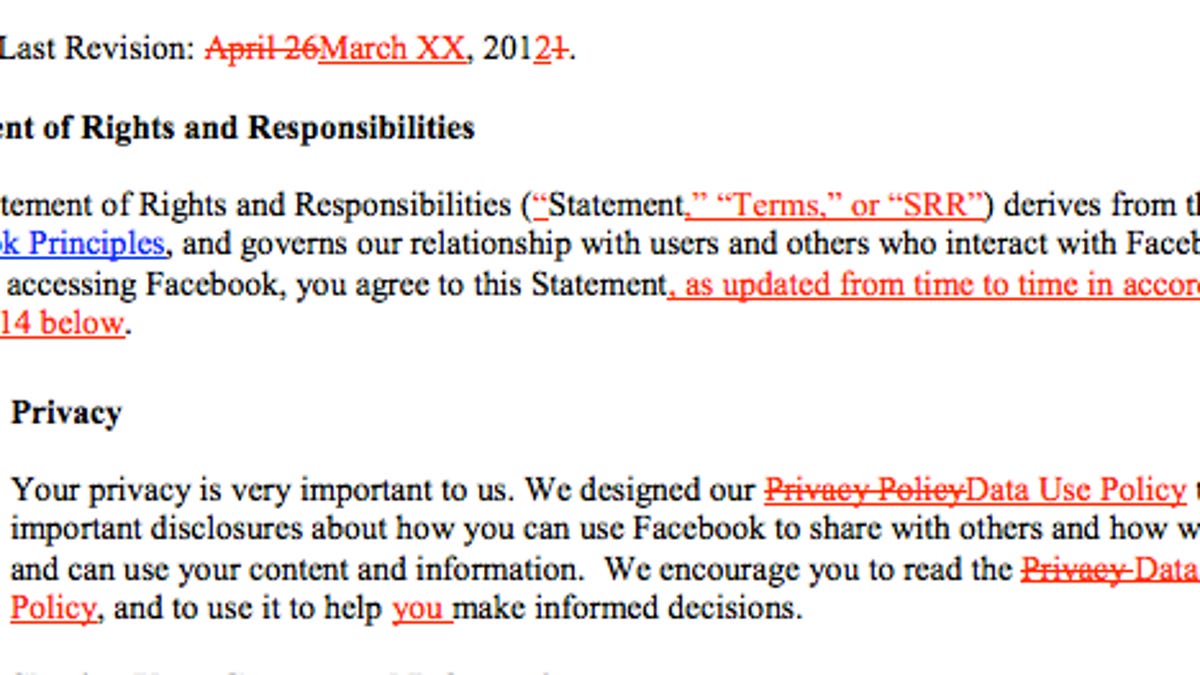Facebook fans flames with privacy policy tweaks
Social network says no significant changes are afoot, but privacy advocates cry foul.

Privacy advocates in the U.S. and the European Union are on edge over changes Facebook is enacting in its language governing its terms of service.
Their upset comes as Facebook is proposing modifications to its Statement of Rights and Responsibilities (PDF) that, at least on the surface, seem fairly minor and don't indicate any radical shift in thinking or practice in terms of privacy.
Specifically, the revised document says that the "Privacy Policy" is now called "Data Use Policy," wording that was changed in the company's actual privacy guidelines more than a year ago, spokesman Barry Schnitt told CNET today. "We're just making the Terms consistent."
The document also has other wording changes, but they do not outline any meaningful modifications to the company's practices. For example, the document now specifies that a user's data is shared with the apps that friends use. This has been the case for about five years and is explained in the privacy policy, but wording was added to the terms of service to clarify, according to Schnitt.
"Facebook is a social Web site and so is our platform," he said. "Apps need data from friends to develop these social experiences and that is the whole purpose for our platform. If you're not comfortable with that, you can use your app settings to control what friends can share about you, block individual apps, or you can turn off the platform altogether."
But Sarah Downey, privacy analyst and attorney at online privacy company Abine, said with the changes Facebook is acknowledging that its focus is on collecting user data.
Schnitt insists that no changes are being made to Facebook's privacy policy and the clarifications "do not change one thing about how your data is used."
German officials are complaining that Facebook isn't doing enough to provide users control over their data and is instead giving users more duties and less rights. In a statement issued yesterday, the officials accuse Facebook of giving itself the right to "comprehensive tracking of registered and un-registered users."
Facebook added the words "and non-users who interact with Facebook" to a provision in the terms of service that say users consent to having personal data transferred to and processed in the U.S., and other conditions. Another section says "You will not tag users or send email invitations to non-users without their consent" and the words "or tag users if you know they do not wish to be tagged" were added to the end of that sentence.
Moritz Karg, spokesman for the data privacy and information freedom authority in Hamburg, argues that Facebook should be responsible for blocking tags on people who don't want them, instead of individual users, and is worried about Facebook's use of facial recognition technology, IDG News Service reported."If you don't want someone to be able to tag you, simply block them," Schnitt responded. "If you're tagged by someone else and want to remove it, we make that easy. We also created an easy way to complain directly to the user about a photo you don't like."
Downey of Abine also noted that Facebook tracks non-users on other Web sites using JavaScript code that grabs IP address, site visited, and other information when people visit a site with a Facebook "Like" button on it. "I don't think people realize that if you go to a non-Facebook site the 'Like' button can track you, even if you don't click on it," she said. "They consider you interacting with it if you're merely viewing the page."
"Rumor is that post-IPO Facebook will try to launch its own ad network. So this tracking across the Web on non-Facebook sites suggests that," Downey said. "Facebook is a data collection machine and that's how they make their money."
The German officials also complain that Facebook didn't give users enough time to provide feedback on the changes. The company notified users via the Facebook Site Governance page a week ago and gave them until 5 p.m. PT today to comment. As of this afternoon, there were more than 700 comments, many of which were negative but not related specifically to the proposed terms of service changes.
"Rather than simply imposing changes on users, we propose them and invite feedback," Schnitt said. "We are the only site that I know of that proposes changes, solicits feedback, answers questions, and makes changes before the documents are official."
Facebook settled a complaint with the Federal Trade Commission about its privacy practices last year, agreeing to let users "opt in" to changes that alter how their data is shared with advertisers and other users, among other things.
Online privacy and, in particular, privacy policies are a hot topic right now as companies grapple with balancing how to make money off advertising without violating users' privacy rights. For instance, Google has suffered the wrath of the public over changes it made to its privacy policy earlier this year that will allow it to combine user data from across its broad swath of services. The move has provoked a backlash from privacy advocates and lawmakers.

